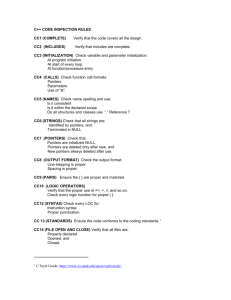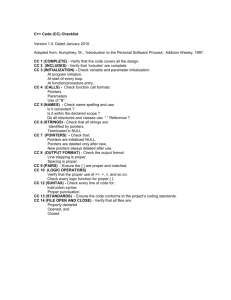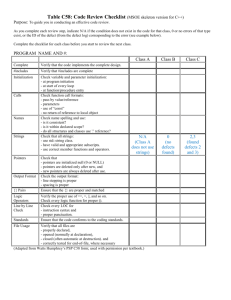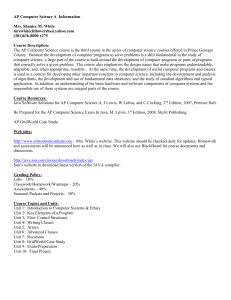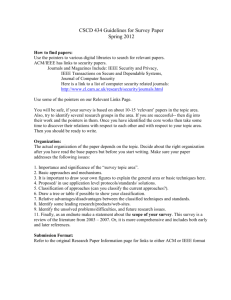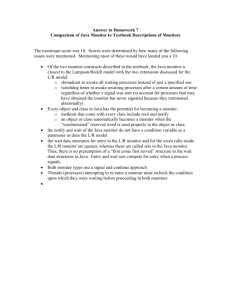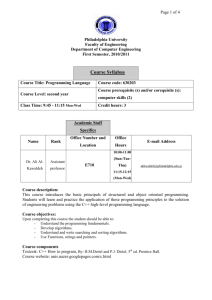finish Pointers / References, start C++
advertisement
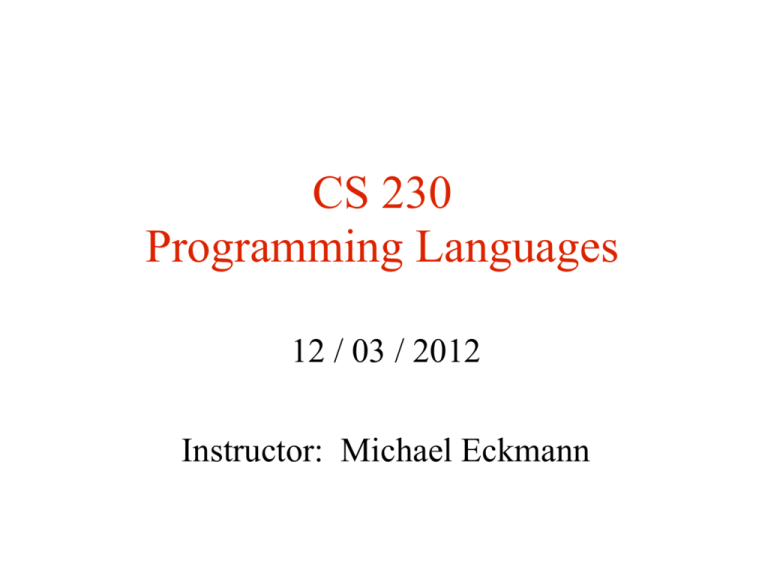
CS 230
Programming Languages
12 / 03 / 2012
Instructor: Michael Eckmann
Today's Topics
• Questions? Comments?
• Pointers / references
• Start C++ (vs. Java)
Michael Eckmann - Skidmore
College - CS 230 - Fall 2012
Pointers
• Reference types in C/C++ and Java and C#
– C/C++ reference type is a special kind of pointer type
• Would there be any use for passing by reference using a
constant reference parameter (that is, one that disallows
its contents to be changed)?
– Java
• References replace C++'s pointers
– Why?
• Java references refer to class instances (objects), so
arithmetic with them doesn't make sense.
• No dangling references b/c implicit deallocation
Pointers
• Reference types in C/C++ and Java and C#
– C#
• Has both Java-like references and C++-like pointers.
• Best (or worst) of both worlds?
• Pointers are discouraged --- methods that use pointers
need to be modified with the unsafe keyword.
Pointers
• Implementation of pointers
– Pointers hold an address
• Solutions to dangling pointer problem
– Tombstones
• A tombstone points to (holds the address of) where the data is
(a heap-dynamic variable.)
• Pointers can only point to a tombstone (which in turn points to
the actual data.)
• What does this solve?
• When deallocate, the tombstone is set to nil.
• Why aren't they used do you think? --- Know of any languages
that use them? (read from book)
Pointers
• Solutions to dangling pointer problem (continued)
– locks-and-keys
• Pointers and variables need different implementation for this
method
• Pointers are ordered pairs of an integer key and an address.
• Heap-dynamic variables
– include a header cell that stores a lock value
– and storage cell(s) for the variable itself
• During allocation a lock value is calculated and placed in the
key portion of the pointer AND the header cell of the variable.
• Key and header cell are compared when the pointer is
dereferenced and if they're the same it's a legal reference
otherwise it is an illegal reference (which causes run-time
error.)
Pointers
• Solutions to dangling pointer problem (continued)
– Locks-and-keys (continued)
• Multiple pointers may point to the variable but they all must
have the same key.
• When variable is deallocated (explicitly), the variable's header
cell is changed to an illegal lock value (so no key will match it
ever.)
– Any other solutions you can think of to handle the dangling pointer
problem?
Pointers
• Solutions to dangling pointer problem (continued)
– Any other solutions you can think of to handle the dangling pointer
problem?
• Don't allow programmer to explicitly deallocate heap-dynamic
variables. Like Java and LISP. Also like C#'s references (but
not like C#'s pointers.)
Pointers
• Solutions to memory leakage problem
– Reference counters
• Store a reference counter for each memory cell whose value is
the number of pointers currently pointing to it.
• When pointers change value or are destroyed, the counter is
decremented. It is also checked to see if it is zero. If it is, then
the memory can be reclaimed.
– Any drawbacks to this method?
Pointers
• Solutions to memory leakage problem
– Reference counters (continued)
• Any drawbacks to this method?
– Space
– Time
– Circular references
Pointers
• Solutions to memory leakage problem (continued)
– Garbage collection
• Every heap cell needs a bit or possibly a field as a flag to
indicate whether or not it contains garbage.
• When want to reclaim memory the garbage collector will
– 1. Set all the flags as “containing garbage”
– 2. Go through the program and determine all the memory
that is being pointed to --- and changes the flags for those
cells as “not containing garbage”
– 3. All the ones still marked as “containing garbage” are
reclaimed.
– All preceding discussion assumed that the heap cells were all the
same size. Major difficulties arise when non-uniform size cells are
used. Why?
C++
• C++
– Bjarne Stroustrup (designer and 1st implementer)
– designed to be fast
– object oriented
– C is almost a proper subset of C++
• that is, a valid C program should typically be a valid C++
program
Michael Eckmann - Skidmore
College - CS 230 - Fall 2012
C++ vs. Java
• In C++ but not in Java
– can use pointers to memory locations
– have a pointer to a reference to an object that has been
returned to the heap (destroyed)
• dangling pointer problem
• explicit programmer deallocation of memory allowed
– memory leaks
• no garbage collection
– array indices are not checked
• unpredictable behaviour when accessing array elements
beyond end of array
Michael Eckmann - Skidmore
College - CS 230 - Fall 2012
C++ vs. Java
• In C++ but not in Java
– allow use of uninitialized variables (causes runtime
error)
– allowed to not return a value from a non-void function
– can overload operators
• e.g. for a class I can overload the + operator to perform
some operation on objects of that class. more flexible than
requiring a function.
– can have global functions that are not part of any class
Michael Eckmann - Skidmore
College - CS 230 - Fall 2012
C++ vs. Java
• In C++ but not in Java
– has a preprocessor which can be used for (among
other things) conditional compilation
– has the STL which contains things similar to what is
found in Java Collections API
– has templates whereas Java uses generics for same
purpose
Michael Eckmann - Skidmore
College - CS 230 - Fall 2012
C++ vs. Java
• c++ has fewer compile time checks (which
generate errors) than Java
• c++ has fewer run time checks
• c++ has no standard GUI library
• c++ has less standard library functions vs. the
large Java API
• c++ is not as portable as Java, but there are
guidelines out there to which one should try to
adhere for more portable c++
Michael Eckmann - Skidmore
College - CS 230 - Fall 2012
C++ from C
• There are programming features leftover from C
that can be used in c++.
– c-style strings, c-style dynamic memory management,
c-style printing, etc.
• we will look at the c-style way of doing things,
but typically prefer the c++ way.
• we need to know the C ways because they are
part of valid c++ programs and we need to be
able to read code not written by us that may use
the C style stuff and sometimes we might want to
call a C function in some C library ...
Michael Eckmann - Skidmore
College - CS 230 - Fall 2012
• Some types
C++
– int, short, long
– float, double, long double
– any of the above numeric types can be prefaced with
signed or unsigned
– char (typically 8 bits)
– wchar_t (wide = larger than a char)
– bool (0 = false, 1 = true)
• ints can be interpreted as bool (holdover from C which
had no bool), 0=false, any other int is true.
– void
– enum (creates an integer type and named constants)
Michael Eckmann - Skidmore
College - CS 230 - Fall 2012
• Some types
C++
– union
union number {
int x;
double y;
long double z;
};
number num;
Michael Eckmann - Skidmore
College - CS 230 - Fall 2012
C++
// Hello.cpp
#include <iostream>
using namespace std;
int main()
{
cout << "Hello, world!" << endl;
return 0;
}
Michael Eckmann - Skidmore
College - CS 230 - Fall 2012
C++
// #include logically inserts the code from the iostream file into this file
// (Hello.cpp)
// iostream is a system header file so we use the < >
// if we wanted to include our own user-defined header file then we use " "
// int main() is the function declaration (all programs need one main)
// can take 2 arguments if defined with them (int argc, char **argv)
// returns an int
// cout is like System.out.println
// << is an operator for writing
// >> is an operator for reading
// endl is a newline character
Michael Eckmann - Skidmore
College - CS 230 - Fall 2012
C++
// note: cout and endl are in the std namespace (like a package in java)
// without using namespace std, we could:
// std::cout << "Hello, world!" << std::endl;
Michael Eckmann - Skidmore
College - CS 230 - Fall 2012
C++
• The C++ specification does not specify the exact sizes of the
types therefore they are implementation dependent. If you
want to know the size of a type on a particular system, you
can use the sizeof operator in C++ to get this info.
• Let's see a program that uses this sizeof operator and prints
the sizes of the various types.
• You can write C++ programs in many different IDE's,
including Eclipse, but you can also write code in a text editor
and compile it at the command line like:
• g++ mycode.cpp -o mycode.o
• then to execute your program do:
• ./mycode.o
Michael Eckmann - Skidmore
College - CS 230 - Fall 2012
C++
• Like Java,
– C++ has for, while and do-while loops,
– C++ has if's and else's
– C++ has switch statements with cases
– C++ has same arithmetic operators
– C++ has same relational operators
Michael Eckmann - Skidmore
College - CS 230 - Fall 2012
